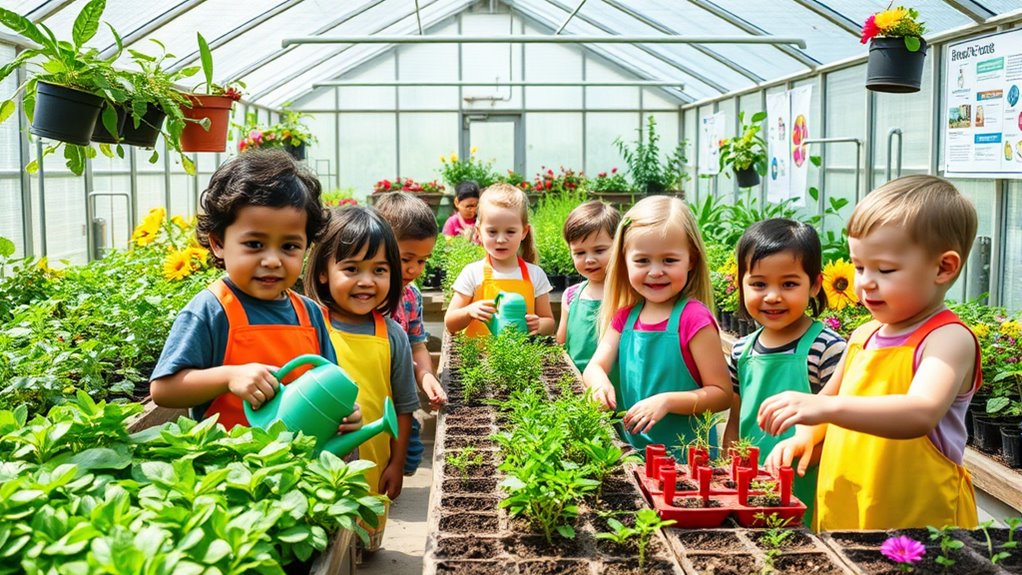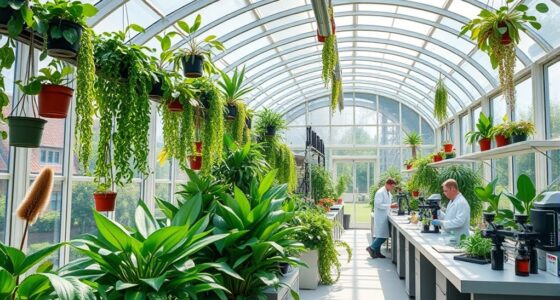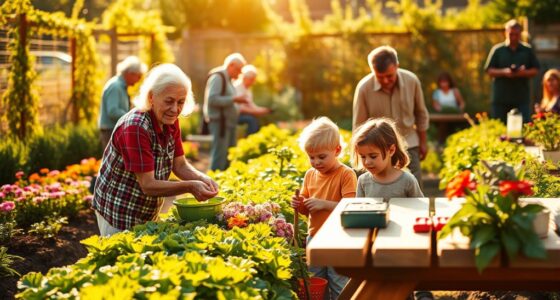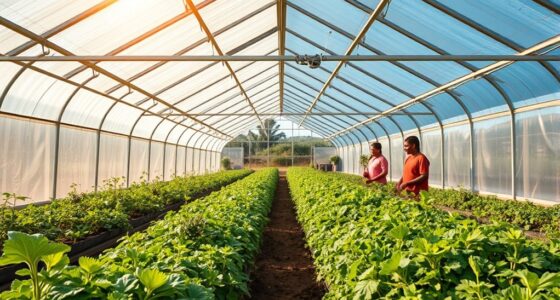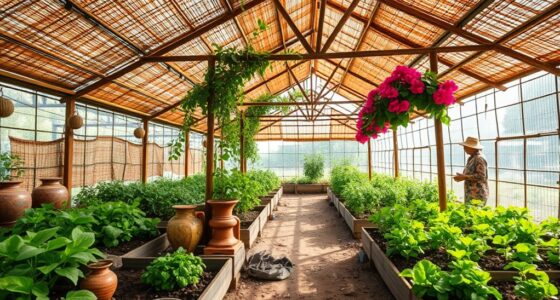Kid-friendly greenhouse workshops offer fun, hands-on activities that plant the seeds for future farmers and environmental stewards. You’ll see children learn about plant care, sustainable gardening, and eco-friendly practices through interactive tasks like seed starting, watering, and creating mini indoor gardens. These experiences boost confidence, responsibility, and respect for nature. If you want to discover how these workshops shape young minds and foster lifelong green habits, keep exploring the possibilities ahead.
Key Takeaways
- Hands-on activities like seed starting and transplanting foster practical gardening skills in children.
- Teaching eco-friendly practices such as composting and organic fertilization promotes sustainability awareness.
- Indoor workshops provide year-round learning opportunities, regardless of seasonal limitations.
- Activities build confidence, responsibility, and patience, encouraging lifelong interest in farming and environmental care.
- The programs inspire future environmentally conscious farmers and citizens committed to sustainable gardening practices.

Are you looking for fun, educational activities that get kids excited about nature? Kid-friendly greenhouse workshops are an excellent way to do just that. They combine hands-on learning with the joy of discovering how plants grow, and they foster an early appreciation for sustainable gardening. When kids get involved in greenhouse activities, they learn about the importance of caring for the environment while developing practical skills that can last a lifetime. These workshops are designed to be engaging and accessible, making it easy for children to connect with the natural world.
One of the main focuses of these workshops is indoor planting, which provides a perfect introduction for young gardeners. Indoor planting allows children to experience the magic of growing plants in a controlled environment, regardless of outdoor weather conditions. They learn how to select the right containers, soil, and seeds, and how to care for their plants through watering, light management, and nurturing. This hands-on approach helps kids understand the basics of plant biology and the importance of sustainable gardening practices. By emphasizing eco-friendly methods, such as composting and organic fertilization, the workshops teach children how to minimize their ecological footprint while cultivating their own mini-gardens. Engaging children in eco-friendly gardening promotes awareness of environmental issues from a young age.
Greenhouse workshops often include interactive activities that make learning fun. For example, kids might start seedlings from seeds, transplant young plants, or create their own mini indoor gardens. These activities not only boost their confidence but also instill a sense of responsibility and patience. As they watch their plants grow, children develop a deeper understanding of the life cycle of plants and the importance of sustainable gardening techniques that conserve resources and protect the environment. The indoor setting also allows for year-round learning, so children can continue their gardening journey no matter the season.
Beyond just planting, these workshops often cover topics like composting, water conservation, and the benefits of native plants. Kids leave with practical knowledge that encourages them to apply sustainable gardening principles at home. They learn that even small efforts, like choosing eco-friendly pots or reducing water waste, can make a meaningful difference. The workshops aim to inspire future farmers and environmentally conscious citizens by showing how gardening can be both fun and sustainable.
Frequently Asked Questions
What Age Groups Are Best Suited for These Workshops?
When considering age appropriateness and workshop flexibility, you’ll find these greenhouse sessions work well for kids aged 4 to 12. Younger children enjoy hands-on activities and simple planting tasks, while older kids can handle more complex gardening projects. The workshops are designed to be flexible, so you can tailor activities to suit different age groups, ensuring everyone stays engaged and learns valuable skills while having fun in a green environment.
Are There Any Safety Concerns for Young Children?
Like a cautious gardener tending tender plants, you should prioritize garden safety in workshops. Young children might be curious about tools or plants, so close workshop supervision is essential. Keep hazardous items out of reach and teach safety rules early. With vigilant supervision, you create a safe space where kids can explore, learn, and grow, just like seedlings reaching toward the sun, ensuring their experience is both fun and secure.
How Long Does Each Workshop Typically Last?
Each workshop usually lasts about 1 to 2 hours, giving you enough time to cover garden safety tips and plant identification. You’ll find that this duration keeps kids engaged without overwhelming them. During the session, you’ll learn how to keep young children safe while exploring the greenhouse, and you’ll get hands-on experience identifying different plants, making the learning both fun and informative.
Can Workshops Be Adapted for Children With Special Needs?
You can definitely adapt workshops for children with special needs by incorporating adaptive methods and sensory accommodations. Adjust activities to suit different learning styles, use visual aids, and provide quiet spaces if needed. By tailoring your approach, you guarantee all children stay engaged and comfortable, creating an inclusive environment where everyone can enjoy and learn about gardening. Your efforts help foster confidence and curiosity in every child, regardless of their unique needs.
What Skills Do Children Gain From Participating?
When children participate in greenhouse workshops, they gain valuable skills like plant care, learning how to nurture and maintain healthy plants. They also develop teamwork skills by working together on projects, sharing tasks, and solving problems collaboratively. These hands-on activities boost their confidence, patience, and responsibility. Overall, kids leave with a better understanding of gardening and the importance of cooperation, inspiring them to explore future opportunities in farming and sustainability.
Conclusion
So, who knew that planting tiny seeds could someday grow into future farmers? It’s funny how these kid-friendly workshops, meant to keep young hands busy, might just inspire a new generation of agricultural experts. Maybe your little one will be the next big name in farming—who would’ve thought? So, next time you see a child digging in a greenhouse, remember: you’re nurturing tomorrow’s food creators, one small sprout at a time.
